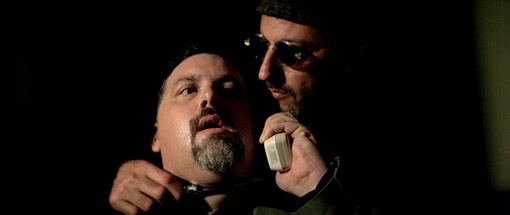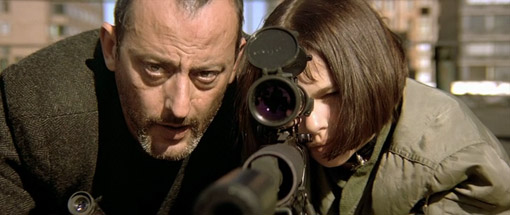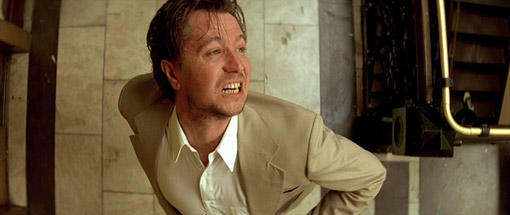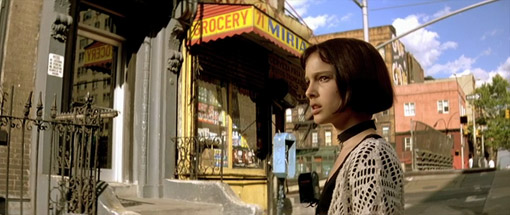Mathilda: "Is life always this hard? Or just when you're a kid?" |
Léon: "Always like this." |
Jean Reno is not, at least by current Hollywood thinking, leading man material. His rough-hewn face is not the sort you'll find on glossy magazine covers, he has bulk rather than personal trainer-shaped abs and waist, he looked to be in his mid-thirties even when he was younger, and he often sports a sandpaper beard and glasses, two real no-nos in the clean cut world of superficial screen stardom. Oh yes, and he has a deep growling voice and a heavy French accent. Oh well, that's it, then. But he can act. By God he can act. And he has the sort of screen presence that a good many surface polished Hollywood stars would kill for.
Reno and director Luc Besson met up early in the film careers of both. Reno was a stage actor who'd scored a few bit parts in works by such luminaries as Raul Ruiz and Costa-Gavras when Besson cast him in his 1981 debut short L'avant dernier. Two years later the director expanded this into first feature, Le dernier combat, providing Reno with his first substantial screen role, albeit one without a word of dialogue. Reno was kept similarly mute for the first half of Besson's second feature, Subway, where his drumsticks did the talking instead, but in 1988 he was promoted to joint leading man as Enzo in Besson's first English language film, The Big Blue. By all rights this should have introduced the actor to a wider American audience, but the film that so beguiled European viewers was recut and re-scored by its US distributor and died a quiet box-office death.
Besson returned to his native language for his next feature, Nikita, and Reno was back in the supporting role, but one that was set to change his career. As Victor, the 'Cleaner' – an ice-cold hit-man called in to sort out bungled jobs, kill any witnesses and dispose of the bodies and evidence – he came close to stealing the film. With shooting on his planned science fiction epic The Fifth Element not due to start for at least another two years, Besson constructed a feature-length script around Reno's character, who underwent a name change and was relocated to New York as an Italian immigrant with the best killing skills on the block. Léon, the film with which Luc Besson finally cracked the American mainstream market and the one that opened the door to Hollywood for its star, was born.

The film kicks off with a stylish bang. Following Besson's signature opening flight across water to the city and a suggestive set-up sequence composed entirely of close-ups, a rotund, drug-dealing gangster known only as The Fatman sweeps into his plush penthouse suite with a heavily armed and protective entourage. They've not been there long when the guards start being picked off by a figure who dodges their security cameras and outmanoeuvres even their fastest gun. With his protection eliminated, the tooled-up Fatman backs into a corner, where a stone-faced, woolly-hatted and sunglass-wearing figure slides silently out of the shadows and holds a knife to his throat. A phone message is delivered and the Fatman is allowed to go. He has been told to leave town. You're left with the feeling that he'll probably flee the country.
It's a mother of an opening, one that not only grabs our attention in the manner so beloved of Hollywood actioners of late, but also establishes beyond a shadow of a doubt just how good Léon is at his job and how potentially dangerous he could be. Then Besson performs a small miracle. Having shown us Léon the emotionless killing machine, he then introduces us to the Léon the quiet loner, and in the space of a few shots completely humanises him. This is the Léon we are invited to empathise with, one who travels by subway train and buys milk at the local store, who watches the dancing of Gene Kelly with wide-eyed wonder, a man whose only friend is a pot plant that he lovingly cares for.
On returning to his run-down apartment, he expresses a guarded concern concern for the wellbeing of his 12-year-old neighbour Mathilda, who is sitting in the hallway after taking a beating from her father. The two meet for the first time here and only in passing, but it's an encounter that's set to change both of their lives. Mathilda's family are no-one's dream neighbours – their fights are loud, frequent and sometimes physical. What's about to make things a lot, lot worse is that dad has been holding a large quality of drugs for a crooked and borderline psychotic detective named Stansfield and has been skimming some off for himself. Stansfield appears to accept the man's claim that he's innocent, but gives him until noon the next day to find out who ripped him off. And Stansfield has his own unique way of convincing people he's serious. He doesn't threaten them, he sniffs them. And when he asks you to find out who's behind something, you just know there will be dire consequences for non-compliance.
In the absence of a sympathetic father, mother or sister figure, Mathilda leaps at the chance to make a new friend in the cautiously reluctant Léon, and the following morning skips off to the shop to buy him his milk. She's not been gone long when Stansfield and his men drop round and slaughter her family. They're still looking for the drugs when she returns to the apartment block, and on catching sight of the bloody aftermath, she walks past her front door and begs Léon for refuge. On discovering just what he does for a living, she asks to be taken on as an apprentice so that she might avenge the murder of her family, and particularly her younger brother. Initially resistant, Léon soon finds himself taking care of Mathilda, and begins training her in the skills required to follow in his footsteps.

Now a small leap of faith is required here if you're going to swallow the suggestion that even the softest hearted contract killer would agree to instruct a 12-year-old girl in the techniques of his profession, but it's a disarmingly easy one to make. Mathilda's desperate determination is very persuasive and the time she spends with Léon sees him almost invisibly adopt the role of surrogate father, chastising Mathilda for smoking and warning her of the dangers of the wrong sort of boy, but also providing step-by-step instructions on how to follow a jogger with a sniper rifle and when best to take the killing shot.
It's here that the film gets into the first of its two morally difficult areas, at least for the mainstream preview audience who reacted with such discomfort to Besson's original edit, resulting in the cutting of sequences that were later restored to the director's cut under review here. It's risky enough to show a young girl being trained as a killer using squibs in place of bullets, but once she accompanies Léon on their first real job and calmly witnesses the hit itself, well that, apparently, is where the problems began. Thus that entire scene and the montage of similar jobs that follow were chopped for the film's first theatrical release. That Léon sticks a gun in the mouth of their pair's first victim probably didn't help in the UK – guns in mouths were still largely no-go territory here back in the 80s and early 90s. But the loss of these scenes also robbed the climax of a key reference point, something Léon calls 'the ring trick', which is later repeated and in the theatrical cut is less effective for having no narrative precedence.
But in terms of moral discomfort, this is petite pommes de terre. Where Besson really walks a tightrope is in the development of the relationship between this seemingly mismatched pair, as Mathilda falls in love with the far older Léon and he shifts from being father figure to potential lover, at least in her eyes. It's dangerous territory for any mainstream movie to walk, the point at which the film could lose a sizeable portion of its audience for whom even the suggestion of such a relationship is little short of outrageous. It's this that saw the loss of a further three key scenes in which Mathilda openly expresses her feelings for Léon, first in a restaurant where the two share a celebratory drink and Mathilda teases Léon for a kiss, and later when she dons a dress and talks to him about the importance of a girl's first sexual experience in a direct invitation for him to fulfil this role – when he declines, she persuades him to share the bed with her and the two sleep in each other's arms. And in a sequence that unites both of the film's moral quandaries, Mathilda holds a loaded gun to her head, ready to kill herself if Léon does not admit his love for her.
But Besson never misses a step. By having Reno play Léon as an adult with the personality of a shy 14-year-old, the character is stripped of even a hint of sexuality and the physical relationship that Mathilda desires is clearly never on the cards. Indeed, Léon's main reaction to his young companion's adult forwardness is one of acute embarrassment, coughing his milk across the room at her declaration of love and looking everywhere for an emotional exit when she performs Marylin Monroe's "Happy Birthday Mr. President" as part of a character guessing game, intimidated as much by his inability to recognise the impersonation as he is by the Lolita-esque sight of a young girl dressed up as a sexually flirtatious adult.

Which is all well and good if the actors can sell it, and once again Besson strikes gold. Reno is just wonderful here, utterly convincing both as an instinctive and lethal shadow warrior and the bundle of awkward adolescent self-embarrassment that is no match for the more socially and emotionally experienced Mathilda. It's the humanity of Reno's performance that enables us to connect so quickly with Léon in the film's early stages, the lonely look on his face as he sits and contemplates his life, his weariness as he stands under the shower, and most beguilingly when sits in a near-empty cinema and watches Gene Kelly rollerskate in It's Always Fair Weather, a look of child-like delight on his face and he gazes lovingly at the screen and looks around for someone to share the moment with.
And then there's Mathilda. For a 10-year-old newcomer, young Natalie Portman is little short of astonishing in this most pivotal of roles, required as she is to exude the confidence and experience of an adult but intermittently let it drop to reveal the frightened little girl hiding beneath. We buy her and Léon as a couple because we believe in them and feel for them as characters, and age simply doesn't enter into the equation. Mathilda falls for Léon because he is the first man who has genuinely cared for her well-being, and Léon comes to love Mathilda because she opens his eyes to the simple pleasures of life that have previously passed him by, from the comfort of sleeping in a bed instead of a chair, to the unique happiness that can evolve from long-term companionship. Socially unacceptable their relationship may seem on paper, but these two really were made for each other.
But it doesn't end there. Heading up the support as the semi-psychotic Stansfield is Gary Oldman at his most dangerously unrestrained, the physical contortions of his drug addiction giving rise to one of the most memorable top shots in Besson's entire oeuvre, his demented bellow of "EVERYONE!" a moment that no-one who's seen the film ever forgets. Old pro Danny Aiello, meanwhile, brings a typically restrained gravitas to the role of Tony, Léon's mentor and employer and probably the film's most ambiguous character, one who looks out for his man and provides him with work but who also exploits him, hanging onto his earnings because he's "Like a bank, but better than a bank," a situation Léon accepts more out of naïvety than reasoned choice.
Léon is the one Luc Besson film you can be sure that even people who don't know who Luc Besson is have seen and loved. In retrospect it's easy to see why, as just about everything here clicks divinely, from the rich characterisations and twist-perfect plotting to Besson's sometimes thrilling direction, infusing the action sequences with a kinetic urgency but knowing just when to slow down and let the characters take the lead. The chemistry between Reno and Portman is so convincing, meanwhile, that even the more light-hearted scenes, where the film could easily have slipped into Hollywood mawkishness, are handled with confident aplomb.

The teaming of a single adult with a child who will change their outlook on life is a tried and tested one that stretches back to Chaplin's The Kid, and even building a film around a hit-man who takes on a young apprentice has its precedence in the previous year's Cible émouvante [Wild Target]. But Besson goes his own splendid and inventive way with both elements, satisfying as many expectations and conventions and he challenges, but in a manner that always serves the story and not the demands of an unadventurous studio. Thus we can have a killer for the central character if he has a moral code we can understand and share ("No women, no kids"), one that is brutally disregarded by the drug-dealing psychopaths he's up against, and we can enjoy an age-gap romance between a grown man and a young girl if the former repeatedly refuses the advances of the latter and we steer clear of nudity and sex (hence the removal of that chat about sleeping together for the theatrical cut).
But the director's cut really is the only one to go for and transforms a great movie into a sublime one. There's no question about it, Besson hit a creative jackpot here, fashioning a tightly structured, beautifully performed and consistently compelling crime thriller around a genuinely moving romantic core, and one whose whose sharp ear for English dialogue belies its French origins. It may not have changed the course of film or even genre history, but like the police rocket that hurtles towards Léon's apartment door in the explosive climax, it'll knock you for six.
Pretty dammed lovely. The quality of the transfers on Optimum's Luc Besson collection have been consistently impressive, and Léon lives up to the expectations built by its predecessors. Unlike Subway, there's no variance here – the picture is consistently pin-sharp throughout – at its best the contrast is spot-on, the earthy colour scheme seductively subtle and the level of detail leaves all previous DVD versions in the dust. This is particularly evident in exterior wide shots, where you can clearly see every vehicle and sign and even the brickwork on buildings, or in facial close-ups, where every pore and hair can be counted if you so wish. There is some crush at both ends of the contrast range in some interior scenes, but this is partly due to the use of colour tinting, and the transfer itself has Besson's stamp of approval. Thierry Arbogast's scope cinematography never looked so good outside of the cinema.
Unlike the previously reviewed Besson discs, which had PCM stereo soundtracks, the sound here is DTS 5.1 surround and a fine one at that, with a strong dynamic range and a crisp level of clarity that really showcases Eric Serra's marvellous, ethnically influenced orchestral score. The effects and dialogue are largely front-weighted, though, and – perhaps more surprisingly – gunshots and explosions feel a little muted instead of rattling the windows and exercising the subwoofer as you feel they should. Otherwise a solid job.
Léon: Theatrical Cut (110:12)
A chance to revisit the cut that first made it to American and UK cinemas, which if you're already familiar with the director's cut (and most hardcore fans will have long ago imported the Japanese or US DVD of this version) is a jarring experience, with the missing training scenes in particular carving a sizeable chunk out of the narrative. As with The Big Blue, the quality of both cuts is identical and likely achieved through branching.
The rest of the extras are all 576p and appear to have been sourced from the American DVD release, hence the repeated reference to the film as The Professional, its US release title.
10 Year Retrospective (25:09)
An initially interesting look back at the film through interviews with cast and crew members (though interestingly, not Besson or Oldman) that starts to lose its appeal before the end, suffering under the weight of back-slapping and an annoying voice-over. It does, however, include a couple of alternative takes of one of Gary Oldman's shots.
Natalie Portman: Starting Young (13:49)
Portman looks back at landing the role and her experiences on the film. Interesting and entertaining, despite the efforts of that voice-over.
Jean Reno: The Road to Léon (12:24)
Voice-over guy is back to introduce an interview with the always enjoyable Jean Reno (I watched this with fellow reviewer Camus, who remarked afterwards that he could listen to Reno all day), who looks back at his career and how it was changed by the success of Léon.
Trailer (1:48)
A reasonable sell as a violent actioner that gives nothing about the plot away.
Besson's biggest US hit is also his most satisfying balance of art, action, character and storytelling to date, and if you're already a fan then this is the version you've been waiting for – the extras may not be that great, but the picture quality is superb and you get both cuts of the film, so you can fully appreciate what you were previously missing. Highly recommended.
|